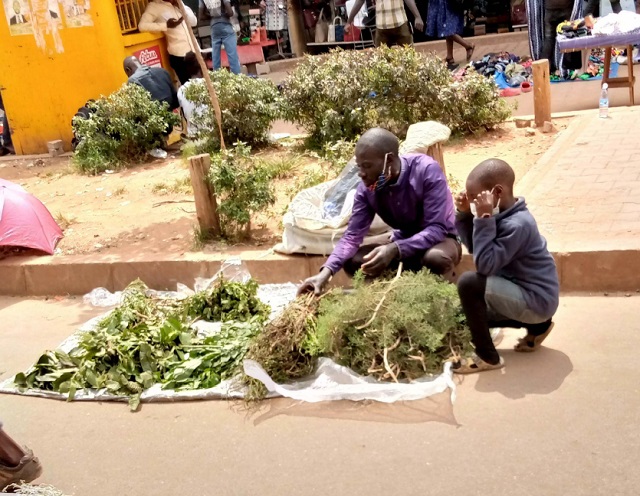
Enter COVIDEX
But even as the UBV-01N COVID-19 drug navigates the tortuous journey of scientific approval, another herbal drug has hit pharmacies and gripped a nation caught in a second vicious wave of COVID-19 and in desperate need of a remedy.
The new drug called COVIDEX is also said to be herbal treatment of COVID-19. But it is also not clinically proven, has not undergone any clinical trial, and it’s unclear how it hit drug shops where its price has quadrupled.
Its developer, Prof. Patrick Engeu Ogwang of the Mbarara University of Science and Technology, has issued a statement that “no clinical studies have been carried out on the drug to determine its efficacy”. But he does not warn against its usage or explain how it was released onto the market without the necessary approvals.
Instead Prof. Ogwang says: “Only a few people have used it so far to relive their symptoms of COVID-19. More proof is needed to show it works against COVID-19.”
Scientists at the Mbarara University of Science & Technology (MUST) are not strangers to manufacturing COVID-19 related products.
The university has a traditional medicine research project called Pharm-Biotechnology and Traditional Medicine (PHARMBIOTRAC). It is World Bank-funded Africa Center of Excellence (ACE). PHARMBIOTRAC has been instrumental in providing their expertise to the government by being an integral part of the scientific task force. Dr. Patrick Engeu Ogwang is a rincipal Investigator of PHARMBIOTRAC.
Just two months after the first COVID-19 cases was announced in Uganda in March 2020, the scientists produced a hand sanitiser as part of their contribution to the government’s efforts to stop the spread of the coronavirus disease COVID-19. Members of the public are encouraged to wash hands regularly with soap and water or use hand sanitisers and to keep at least two meters apart in public and wearing a face mask. The hand sanitisers are still sold in supermarkets and pharmacies in Mbarara town.
PHARMBIOTRAC was established in 2017 at MUST to “advance traditional medicine and Pharm-Biotechnology for socio-economic development of Africa”. Its goal is to build a critical mass of specialised and skilled human resource for that purpose. Other Eastern and Southern countries such as Ethiopia, Kenya, Malawi, Mozambique, Rwanda, Tanzania, Uganda, and Zambia have similar projects.
Regarding COVIDEX, Prof. Ogwang says the drug has only undergone laboratory tests on animals to determine active compounds and safety and clinic trials to prove whether it is effective or not have not yet been done due to funding limitations.
Prof. Ogwang’s statement followed statements from the National Drug Authority (NDA) and Mbarara University cautioning people on the use of a drug that has not yet undergone proper assessment. The NDA advised Prof. Ogwang to change the name of the product and stop making claims that it can treat COVID-19.
President Museveni has also denied being is support of Covidex being mass produced as a cure of Covid-19.
The President’s Senior Press Secretary, Linda Nabusayi, on June 23 told journalists that Museveni met Prof. Ogwang and discussed the Covidex drug. But she said it was not true, as claimed on social media, that Museveni had not given a green light to its production.
“I can confirm that the President has been talking to various scientists, including Prof Ogwang, about developing a Covid cure. This process is still ongoing. HE, however, has not cleared any drugs for production,” Nabusayi said.
Clinical trials are important because they are the main route that researchers use to find out if a new treatment is safe and effective in people.
 In a clinical trial an experiment drug such as Ogwang’s COVIDEX is tested as a treatment to find the appropriate dosage and look for side effects. Normally clinical trials are in four phases.
In a clinical trial an experiment drug such as Ogwang’s COVIDEX is tested as a treatment to find the appropriate dosage and look for side effects. Normally clinical trials are in four phases.
Phase I is a trial of the experimental treatment on a small group of often healthy people (20 to 80) to judge its safety and side effects and to find the correct drug dosage.
Phase II uses more people (100 to 300) and focuses on effectiveness; meaning gathering data on whether the drug works in people who have a certain disease or condition. These trials also continue to study safety, including short-term side effects. This phase can last several years.
Phase III trial gathers more information about safety and effectiveness, studying different populations and different dosages, using the drug in combination with other drugs. The number of subjects usually ranges from several hundred to about 3,000 people. If the drug regulatory authority agrees that the trial results are positive, it will approve the experimental drug for use by the public.
Phase IV trial for drugs takes place after the drug is approved for use by the public. A drug’s effectiveness and safety are monitored in large, diverse populations because sometimes, the side effects of a drug may not become clear until more people have taken it over a longer period of time.
Prof. Ogwang is not the only Ugandan herbalist saying they could have a cure for COVID-19. In January several herbalists from the Acholi sub region submitted 40 potential herbal remedies to the Gulu University Pharm-Bio Technology Traditional Medicine Center (Pharmbiotrac) of Excellence for COVID1-19 for basic scientific drugs tests.
“Many of the concoctions have been used with varying results since COVID-19 was first reported in Uganda,” said Dr. Alice Veronica Lamwaka, a senior lecturer at the Faculty of Bio-Technology and Pharmaceutical Studies.
Dr. Lamwaka, however, said the university was not able to subject the herbal remedies to the required clinical trials because the university lacks the funds to do the tests. She says if supported by government, they can do advanced research.
 The Independent Uganda: You get the Truth we Pay the Price
The Independent Uganda: You get the Truth we Pay the Price


